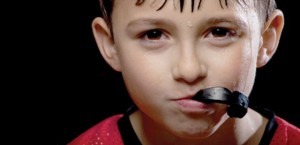In our last post we discussed habits that can impact your dental health. This week we will look at a few more things you may or may not expect can put your smile at risk.
Sports
Should I wear a mouth guard to prevent dental injury while playing sports with my friends?
 All types of recreational activities have the potential to cause dental injury. In a previous post on pediatric dental health we shared the importance of wearing a mouth guard when playing sports. The importance of protecting your teeth does not end when you become an adult. Use a mouth guard while playing sports with a likelihood of facial contact with hard equipment and surfaces, or with other people.
All types of recreational activities have the potential to cause dental injury. In a previous post on pediatric dental health we shared the importance of wearing a mouth guard when playing sports. The importance of protecting your teeth does not end when you become an adult. Use a mouth guard while playing sports with a likelihood of facial contact with hard equipment and surfaces, or with other people.
Colds and Allergies
Are cough drops safe for my teeth?
If you regularly use cough drops to soothe your throat irritated by a cold or allergies, be aware that most have high sugar content. The bacteria in your mouth does not care whether the sugar comes from candy or something considered medicine. Where ever it comes from, sugar can be a foe of dental health by contributing to tooth decay.
Piercings
Can piercings damage teeth?
You may not have made piercings a habit, but if you have either your tongue or lip pierced, you increase the chance of suffering dental injury. A tooth can easily be cracked or chipped by biting down on a metal stud. A lip piercing can also lead to tooth loss from gum damage caused by metal rubbing against the gums. Because of the high levels of bacteria common in the human mouth, tongue and lip piercings also carry a high risk of potentially painful or damaging infection. If you would like a lip or tongue piercing, or already have one, consider potential effects on your dental health and discuss the risks of dental injury, gum damage, infection and tooth loss with your dentist.
Eating Habits
Are there eating habits besides frequent snacking that can damage teeth?
Frequent snacking and poor food choices can play a role in poor dental health. Another eating habit that can harm teeth is binge eating. Because binge eating can involve excessive amounts of sugar and starches, it can in and of itself contribute to tooth decay. If binging is followed by purging and becomes habitual, the teeth will be damaged by repeated exposure to the strong acids in vomit. The acid will erode the enamel, leaving the teeth weak and brittle. Because of the tell-tale damage to teeth, dentists are sometimes the first to suspect someone is struggling with an eating disorder.
Frequent vomiting from any cause – such as GERD, “morning sickness,” medical treatments, or medications – will damage tooth enamel. If you have an eating disorder or other medical condition causing you to vomit, seek medical care.
Be sure to tell your dentist about any medical conditions or treatments, and any medications you take.
Overzealous Oral Care
How can taking good care of my teeth harm them?
Brushing your teeth is necessary for good dental health, but brushing too hard will damage your tooth enamel, weakening it and wearing it down, which can cause sensitivity and even cavities. It can also irritate your gums. Overuse of mouthwash can contribute to dry mouth.
How can I take the best care of my teeth?
Regular visits allow your dentist to keep track of any changes in your dental health. Your dentist can also give you advice on how to avoid potential damage to your teeth, but avoiding various habits or activities or doing them more safely. At Watertown Dentistry, your dental health is important to us. We can provide the best care for teeth that have already suffered injury or decay, to restore your smile’s health and keep it beautiful for a lifetime.
Call us for more information (617) 600-3442
or
